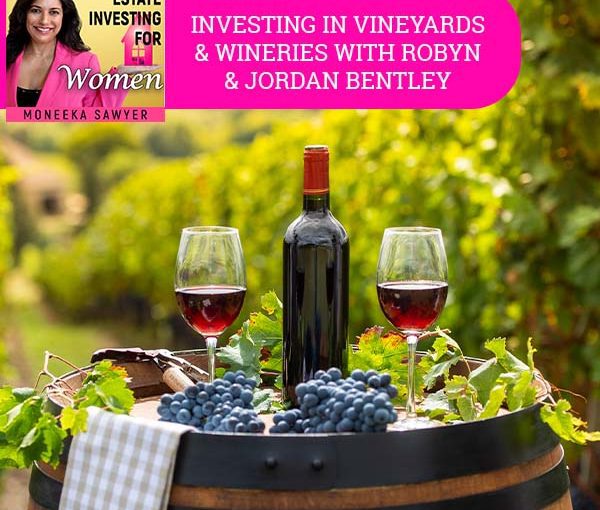Investing In Vineyards & Wineries With Robyn & Jordan Bentley – Real Estate Women
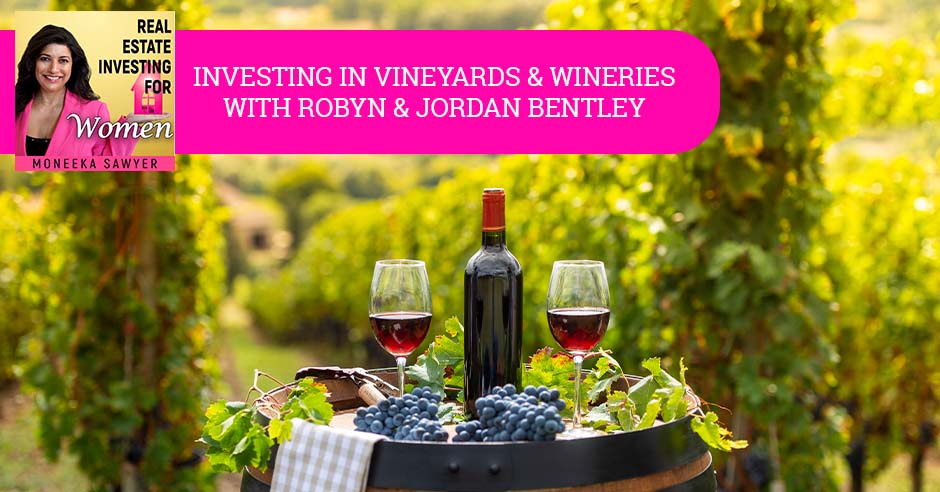
Do you have a passion and interest in wine and want to find ways to turn it into an investment? Perhaps you should be looking into investing in vineyards and wineries! Mother-daughter duo Robyn Bentley & Jordan Bentley of Wine Country Consultants join Moneeka Sawyer to share how they’re helping wine lovers and investors fulfill their dreams and achieve success in their investments. There are so many things you can do in the industry, and opportunities for growth and earning are a-plenty if you know what you’re doing. Robyn & Jordan takes us through different regulations, tax benefits, due diligence, return on investments, and all things regarding investing in these types of land. Tune in to learn more and find out what you need to do to get started.
—
Watch the episode here
Listen to the podcast here
Investing In Vineyards & Wineries With Robyn & Jordan Bentley – Real Estate Women
Real Estate Investing For Women
I am so excited to welcome to the show a fabulous mother and daughter team, Robyn and Jordan Bentley. Robyn Bentley, Broker at Wine Country Consultants, offers unrivaled insights into the world of vineyard and winery real estate. With over 30 years of experience, she has offices in St. Helena, California, Portland, Oregon, and Walla Walla, Washington.
Robyn’s lifelong commitment to assisting women and children in need has led her to volunteer for numerous organizations as well as serve on the board of Community Resources for Children of Napa Valley and The Oregon Children’s Trust Fund.
Robyn raised both her children, Jordan and Ross Bentley, in St. Helena and is very proud to have them as partners in the WCC team. With an MFA in photography and teaching experience at Tufts University, Jordan’s creative eye, dedication to detail, and knowledge of the Napa Valley are invaluable assets to the family real estate business. She serves as the President of Our Town St. Helena, a nonprofit dedicated to providing and creating affordable housing for all in St. Helena, California.
—
Ladies, thank you so much for joining me. Welcome to the show.
Thank you for having us.
I’m so happy to meet you.
You too. I didn’t tell you guys in the green room, but I moved to Napa in the sixth grade. I went to Napa High School. I’m a Napa native, also. I never have people on the show from that area. It’s amazing to meet you.
We are honored to be your first. How long did you live in Napa?
I lived in Napa for 6 or 7 years. It’s so nice.
Did you enjoy it?
It was a weird time. I was there in the ‘80s. I enjoyed it, but I didn’t realize how much was going on behind my back until I left. I went to UC Berkeley from Napa. It was a completely different cultural thing, but I will say this. My husband and I will frequently do our weekends away, probably 2 or 3 times a year, to Napa to get me re-grounded. I was there when I was a teenager. They were the biggest, most important years of my life. It was my development. It helps me to ground, so we love going back. I do love that area very much.
Please, next time you’re in the area, join us for a glass of wine.
I would love that.
We’re in our office in St. Helena. We’d love that.
I love that. We’re planning something. We were thinking about going to Bistro Jeanty. It is my favorite. Maybe we could do some wine before that. I would love that.
We do, too.
After we’ve got all our social stuff planned, let’s talk more about you. Tell us a little bit about how you got into investing in wine property and helping people do that.
We moved here in 1993 to St. Helena, right in the middle of Napa Valley. Jordan’s father, my first husband, it was his job that brought us here. Clark Bentley was hired as the CFO for Pine Ridge Vineyards. We all grew up in the wine business because Clark brought us here. We had lived in Mill Valley for ten years prior to the move here and had come often for weekends and getaways.
We looked at investing in vacant land during that time, thinking maybe we would do a second home and never imagining that we would find jobs in this wine world. We love wine and the lifestyle, which is a rural, Midwestern value community. I grew up in Illinois. Jordan’s father grew up in Oklahoma. We moved to California in ‘79. We continued to want to raise Jordan and Ross in an environment that was inclusive and very much a part of a smaller community. We had spent some time in Marin, which was growing and quite active at that juncture.
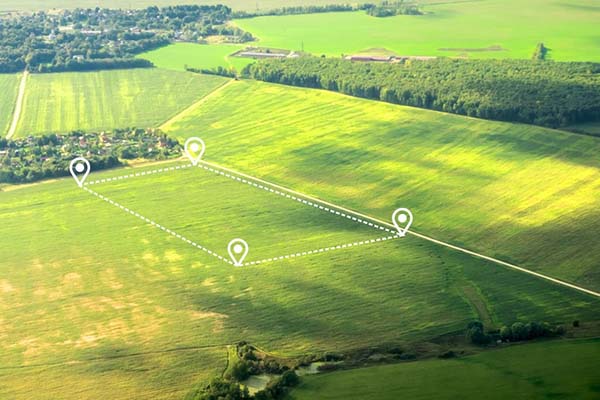
Investing In Vineyards: We looked at investing in vacant land during that time, thinking maybe we would do a second home, never imagining that we would actually find jobs in this wine world. We just loved wine and we loved the lifestyle.
With that move here, I decided to step into the real estate world. I had been a buyer for Macy’s, California, in my first career. I ended up buying women’s shoes and traveling the world doing that. I have a great background in marketing, assessing numbers, understanding investing, and what kind of return you want.
The next career phase I had was with the Waverly Children’s Home. I was the community relations coordinator. That was during the Follow Your Heart and Follow Your Dream Oprah Winfrey influence, which I loved. It fits in with my commitment to helping women and children. I started volunteering in my mid-twenties, about the same time that I had Jordan. Jordan, all along, would come to events, help set up, and was always involved with any of the volunteer work I did.
Arriving here in ‘93, Jordan was in fourth grade and Ross was in kindergarten. I decided that I would follow my real passion, which had always been real estate, but I had this sense that it was going to take too much time away from raising my children. Real estate, at that point, was always talked about being a night and weekend gig.
In reality, because the focus is the wine industry, wineries, and vineyards, which is much more of a commercial aspect, the business is more of a 9:00 AM to 5:00 PM for us back then and now. It worked very well. The lure of real estate, especially in Napa Valley at that time, was that every property was unique. I liked that. It gave me my first opportunity to deal in land. My first real estate transaction was a vineyard transaction. It was my first million-dollar transaction. I was hooked.
That is one that’s interesting. It is land rather than residential. That is such an interesting way to go about that. Jordan, tell us a little bit about how this worked for you. You’re what I call a legacy. I’m a legacy, too, with my parents. We got a lot of mentorship through osmosis. A lot of people turn their back on the business. They’re like, “No, thank you.” Tell us a little bit about your story on how you joined your mom in all of this.
I was always there helping her out and setting up her volunteer groups, but that quickly morphed into helping her with open houses and all of her residential listings here in St. Helena. I like to say that I grew up in real estate. I always loved it and I always loved to be with mom and help her out as much as I could. I did go off after high school. I went to Colorado to earn my undergraduate degree at Colorado College. I then went over to Boston and earned my Master of Fine Arts, Photography from Massachusetts College of Art and Design. I followed my passion for the arts, photography, and teaching. I was gone for almost eleven years in total.
Mom and I, whenever we were parting, between the boohoos, would say that one day, we were going to live down the street from each other. It is true to this day, but at the time, we didn’t know how it was going to work out. The stars aligned. I was in Boston and had a pivotal point in my, “Do I keep going on this teaching career path, which I love, or do I take a big leap of faith, move back to California, and see where life takes me?” I went with the big leap of faith and I’m so happy that I did. A big part of that, who’s also a partner of ours, was my brother, Ross Bentley. He was living here in St. Helena, working as a winemaker. I wanted to come back and be able to have more time with him as well.
I came back and started helping mom with my photo background. I started with marketing. I started learning about her business, which is the real estate business, and the industry here through photographing, assisting, and creating the marketing pieces for her listings. I was hooked right away. It wasn’t until I was on site being her eyes and ears as a note taker because she was juggling a few different things at the time, that I got to see the land use consultant, the current owners, and the buyer that was in escrow. We had a civil engineer out. Everyone was talking about the various possibilities of how to successfully achieve receiving a permit for the winery on that property and how best to support that. I loved it. I was hooked. I loved all the bits and pieces of the puzzle.
In the photo world, I’m a big dark room rat. There are so many different ways to create that final product, as there are so many different ways to create a successful project and investment on a piece of land. That part of my brain dived in and started clicking. I asked mom a few months later how she felt about me earning my real estate license and joining her in a larger capacity. You were extremely excited and hoped it would go in that direction. That was the beginning of our official partnership. That was a couple of years ago when I started getting my license. We’ve been having way too much fun ever since.
There's so many different ways to create that final product just like there's so many different ways to create a successful project and investment on a piece of land. Share on XI love that. It’s so much fun to watch. I left high school in ’87. I moved there in ‘79. We did all of our leadership conferences at Robert Mondavi. There were very few wineries. Robert Mondavi was trying to spearhead that industry in that area. It was a baby industry. There were maybe ten wineries. Maybe I’m exaggerating. That’s Napa proper on the way up to St. Helena in Yountville and all of those areas. It has been fascinating to watch the way that the wineries and everything have exploded. It’s gotten so much bigger. There are so many more opportunities.
It’s been fun to watch the industry expand and grow and see the wines get better. The reason I was telling you all of this is it does seem like building a dream. It’s what you were saying, Jordan. There are so many different pieces and people that come up there from the valley, all over the country, and the world to start a winery there. You start with this idea and you build an entire dream. It is beautiful. I’ve watched it over the years happen over and over again. It’s fabulous to meet some of the people that are making it happen.
It is a huge passion of both of ours to assist each and every one of our clients that comes to us no matter where it might be, whether they’re from outside of the wine industry but they’ve had a passion for it, all of us here loving the area, the valley, and the connection and then wanting to grow that, or if it’s an existing vintner or grower that is within the wine industry. They’re wanting to expand, build upon their dream, and create even deeper roots with their own legacy. I see it as an extreme privilege to be able to be one piece of that puzzle or one spoke of that wheel for them to achieve their success.

Investing In Vineyards: It is an extreme privilege to be able to be one piece of that puzzle, one spoke of that wheel, for them to achieve their success.
Tell me. When people come to you, do they have their checklist and they’ve got their budget? Do they have their vision or do you help massage that? What’s the number one reason for investing in Napa Valley?
The number one reason is that people love wine, to begin with. In some cases, they have the financial capacity to jump into that world maybe within the first few years of going, “I like wine. I like this area. How can we begin to put a little foothold down?” We have been talking with a gentleman who’s a dentist who identified the buyer for his business in Arizona. He’s going to retire in a couple of years. He invested in a vineyard site that he will start working on so it is ready for him when he arrives. He has been loving wine for many years. This will be the beginning of that new dream and passion for the rest of his life after coming out of dentistry.
Do people normally have a vision or are you normally massaging that vision? How do people come to you?
They are from clients from all different parts of the world, so to speak, and different industries. In terms of their own checklist, people come with a relatively clear vision. With the dentist that Robyn was describing, he has a clear vision and that he wants wine. He is creating a brand to be his next step in life. A few years ago, we had a client call us. He was a real estate developer in Colorado and on the east coast. He called up and said the same thing. He was like, “I love wine. How do I start?” We did help flush out the various steps and connected him to the various consultants and players within the industry that would help him gain success in the dream that he had.
It starts off with, “I love wine,” and, “I want to create something.” That usually is a brand. I have one way or the other. We have people that have been in the industry since the “very beginning.” We have some people that we’re connected with and clients that are 6th or 7th generation in Napa Valley. They’ve been either growers, winemakers, or vintners and have their own successful brands and labels that are well-known to us all. They are wanting to have more supply, which is more vineyard land, or perhaps they have a second label and they want a new home for that brand. We assist the whole gamut. They come to us.
The ones that are already within the industry have a very specific and clear checklist. It’s a lot of fun to help them achieve that. For instance, from the vineyard’s point of view, location and varietal needs are huge. We have a lot of fun hearing, “We would like X amount of acreage with this varietal and this AVA.” We then get to go out, do our best, and find that connection for them.
We’re putting a deal together for a grower or vintner who wants to expand supply. We started that search a few months ago because he was very specific about the varietal, location, and orientation of the vineyard. There were a lot of details. All sorts of things went into that checklist. We didn’t know if we were going to make it. There was a tax exchange involved. We serendipitously came across the ideal property for him that we are excited to be moving forward on.
Do you feel like you’re usually able to check off all of their checkboxes?
I think so. With what Robyn said about that timeline, the timeline for a wine industry investment, which is land, vineyard, and wineries, is much longer than your typical residential timeline. When we do get that checklist, it is our goal to meet every single need.
A lot of times, though, what’s interesting in the process of searching is whenever we see something and it only checks off two of the boxes, but we think it could still be an interesting investment that also can shift and change their checklist, so to speak. Sometimes, it grows, and sometimes, it goes even narrower. We have been lucky in that majority of the time, we’re able to make sure that they get what they want and sometimes more.
I’m curious. Usually, people will come up and invest in the winery parts of Napa Valley because they have an interest in wine. Do you find that most people invest because they want to start growing grapes or because they want to open a winery? There are so many different things you can do in that industry. Do you find that some people just invest for growth? Is there a lot of growth? Let’s talk a little bit about that. Maybe you love wine, but you don’t want to get your hands dirty in it necessarily. You don’t want to work it, but you’re very interested in the industry and investing in it. What’s the growth like in the industry, and are there possibilities for that?
There absolutely are. The biggest growth potential in Napa Valley is real estate appreciation. Making money as a vintner is a very hard road. Some people knock it out of the park. Other people struggle forever, but they are okay with struggling because they love the lifestyle and they’re doing what they love to do.
The biggest growth potential in Napa Valley is real estate appreciation. Share on XLet’s say your first investment in possibly coming to the valley is buying a home. Depending on whether you want to use it or not, you are buying it as an investment with a vineyard surrounding it. You could start with a minimum of five acres and a house that you use on weekends. You could also rent it out and receive income and tax benefits from the vineyard. Those are some interesting additional benefits to the investment.
Learn how you feel about it as time goes on. That small step of buying a vineyard into the wine world will open up your understanding of how the process works and how viticulture and winemaking go hand in hand in a short, easy way. There’s support around all of that. Let’s say you thought, “I have an extra $1.5 million or $2 million. I’ll buy a house and some vines.”
Part of Wine Country Consultants’ passion and what we bring to the table is that we have worked with our consulting crew for many years also. Everyone is at the top of their game. Everybody’s game is to make you successful. We would be able to help you with a vineyard manager. We’ll be able to help you with an accountant and things that you may need going forward.
Let’s say five years down the road, we can all look at different periods of appreciation. They call it California Gold for a reason. With real estate, if you can get in and make a stand in a very short period of time, you’re going to have significant equity. Part of our job is to understand all the pieces of that vineyard vibe. We’re like, “What is the age of the vines? What’s going to cross going forward so that you have a clear map and you can afford this 5 to 10-year hold?” Maybe what you do is sell that in the future. If you like what this business is doing, maybe you go to a little bigger vineyard or a second buy. Maybe that vineyard’s in a different AVA.
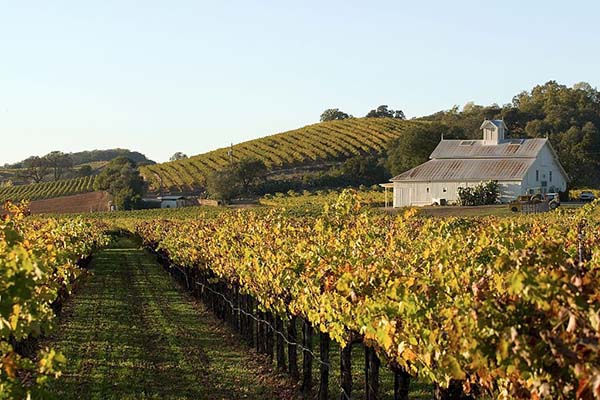
Investing In Vineyards: They call it California gold for a reason. If you can get in real estate and make a stand in a very short period of time, you’re going to have significant equity.
What do you mean by AVA?
AVAs are American Viticulture Areas. We have around fifteen or so in Napa Valley. AVAs are micro-climates within Napa Valley. We have Howell Mountain AVA and Spring Mountain AVA. Stags Leap is probably our most famous and most expensive. Washington and Oregon all have viticulture areas. The pricing is different for almost every AVA. The growing conditions are different. The varietals are different. That decision-making for a first-time investor in what AVA they would like to be in is generally reflective of the wine that they like.
That decision making for a first time investor on what AVA you would like to be is reflective of the wine that they like. Share on XYou brought up some interesting points. I know that you are not tax consultants or anything like that, but there are some very specific tax benefits that you get from owning. Vineyards are considered agriculture. I know the disclosure. You’re not CPAs, but you understand what people are going for. What are some of the tax benefits of owning, for instance, a house surrounded by a vineyard?
We are not tax specialists, but we can connect you with several people that are and the ins and outs and specifics of them. To be honest, I cannot give you exact examples. There’s something in California called the Williamson Act. Do not quote me, but I believe the property has to have 70% of it dedicated to ag in order to receive a lot of tax benefits that are through property taxes and things of that sort. That’s one avenue. Even if it’s not in the Williamson Act, there are benefits if you have a certain amount of your property dedicated to ag. Let’s say 99% is dedicated to vineyards and growing grapes.
Also, ag can be considered as cattle land or orchards. There is a whole bunch across the whole state of California and all over the country. In the state of California, there are lots of different departments in ag. Also, with the fruit, I know that there are benefits depending on the sales. Vines have value there that is an asset to the land that then is depreciated. Depending on what your growing program is, there are also some benefits in that department as well.
Within the last couple of years, the vintner community has gotten good at understanding multiple ways to depreciate a vine. There are also cost benefits to identifying the AVA. When you buy a vineyard, some AVAs cost more than others. That cost difference is also a tax benefit. The depreciation of the vine itself is also one avenue.

Investing In Vineyards: Within the last 20 years, the vintner community has gotten very good at understanding multiple ways to depreciate a vine. When you buy a vineyard, some AVA cost more than others and that cost difference is also a tax benefit.
There is also the depreciation of the irrigation lines. All these things go very deep. Larger growers and vintners go deep because it’s worth doing so for every penny that it takes to be successful. Starting on the smaller end, maybe not so much, but there are agricultural advantages to it. We are doing our own little video series with some of our consultants talking about different aspects. One of our future conversations is going to be having a wonderful accountant and consultant explain in detail.
The reason we depreciate a house is that it’s losing its value. It is an asset that is not as nice. Things break and stuff happens. Depreciating a wine is because the vines get better with age.
If you’d like to do an Old Vine Zin, perhaps there are lots of reasons to keep that 50-year-old vine. The life cycle of a vineyard has its peak and then it starts to trail off.
In Napa Valley, that’s around twenty years. If a vineyard’s twenty years old, all of a sudden, there’s a little talk about replanting. We generally don’t go longer than about 30 years before there’s a replant. Many changes happen over time. They learn so much more about how to orient rows and growing practices that the vintners get excited about that change up. It is not only the orientation towards the sun but should they be 4×7 or 5×6. These kinds of things play into that decision to replant.
When we look at the return on investment in a vineyard, you gain that return through selling your fruit, which is selling tonnage. For Napa Valley Cab, in general, they’re growing fruit to come in at about three tons per acre. That compared to the central coast, where they’re doing more of a bulk supply issue, they might be growing to 6 to 7 tons.
When we look at the return on investment on a vineyard, how you gain that return is through selling your fruit, which is selling tonnage. Share on XUnderstanding as divine ages that the tonnage, because they all end up with some disease, which is also a matter of fact as we age, things start to fall apart. The investor is constantly looking for that breakeven. They’re like, “How far can I go before the tonnage and the vineyard is going to start predicting that I need to replant?”
We lived in France for a year and a half, too. There was a lot of talk about purchasing old vines and making sure that you’re getting the right kind of fruit. There’s an old vine culture in France. It sounds like it’s not quite the same.
It’s not the same in Napa. Even in Willamette Valley, which we like a lot, they love their old vines. They are 60 years old. They make a big deal about it, but not so much here. Jordan mentioned Zin. Zin seems to be the one where people can hang onto some vines for 40 to 50 years and still sell, even if it’s only producing a ton. Maybe that ton is worth $20,000. It makes sense for them to keep farming.
That’s so interesting Willamette does that. I’m crazy about the Willamette Valley wines.
We are, too. We have an office in Portland. They’ve taken a huge market share from Sonoma Valley in terms of Pinot. At the same time, Sonoma Valley and Willamette Valley played beautifully together in making Pinot Noir much more popular than it’s been in many years.
They have a completely different flavor, so they fill a different need. As I’m thinking about it, I’m not a wine person, but I can taste the difference between a Sonoma Valley Pinot, a Willamette Pinot, or a French Pinot. The grapes make a huge difference. I thought how old the vines are and stuff like that made a pretty big difference. I do think that if older vines are based on what you’re saying, where old vines are valued and they can sustain themselves without getting diseased, they’re going to produce a very different kind of flavor. You pay for that more, wouldn’t you agree?
Yes.
Absolutely.
The price per ton of that fruit is reflected in the bottle.
We talk a lot about investing. You come in and you invest in a 5-acre vineyard right off the bat. If someone buys fruit from that vineyard and it’s not branded, then it would go into the program that may not necessarily need to call out that vineyard on their bottle. If it’s a branded vineyard with some good legs on it already, so to speak, then a lot of times, the growers will require that the vintner puts the name of that vineyard on their bottle. It would be Napa Valley from the XYZ Vineyard.
They called it the vineyard designate.
Talk to me a little bit about financing with these vineyards. It’s not going to be the same as we’re used to in other places. Could you tell us a little bit about what’s different and how it works?
We had a long conversation with Nick Cadigan, who’s an appraiser for AgCredit. We work with all the lenders in the valley very closely. You have options for lending. You can go with a traditional lender like AgCredit. Silicon Valley Bank is big in the area. There are also small business loans available. We have done a lot of work with Jeff Clark with Live Oak Bank. You can get a loan that will be amortized over 30 years.
There are some real benefits to digging into what your lending options are. That process is something that is for the first-time investor or for any investor. That’s where you want to start. You’re like, “What terms am I looking at? What expectations does the lender have of what I am purchasing?” The lender will go deep into your business plan and help you be successful. We work hand in hand with our clients and lenders all the time. In Napa Valley, we are also lucky. 80% of the transactions that we do are all cash transactions.

Investing In Vineyards: There are some real benefits to digging into what your lending options are.
That was going to be my next question. Do people use leverage? How much do you need to put down? Can you get loans and that sort of thing? If you’re going to finance it, first of all, do you think that’s a good idea? If you do, how much do people usually need to put down on a loan like that?
It’s generally known it is wonderful to have cash on hand and be able to receive a loan that has wonderful terms and rates. In a lot of ways, that is very beneficial. If you look into both options, absolutely. The lenders that Robyn spoke of and others have wonderful options for our clients and anyone looking to invest. It is a bit different than a residential play. Even though some of our lenders can sometimes accommodate 0% down, which is full funding, that is rare. I would say, typically, you are looking at a minimum of 20% but more than 30% of what you’re putting down. 30% down and then 70% is put towards the loan.
That’s like most rental properties that we buy. You usually have to put 25% to 35% down, even on residential.
Live Oak Bank, for example, has a program where if you’re already in the business, making money, and it makes sense, they will do the full loan amount and will also then loan for improvements.
That’s what I was going to ask. That’s the next step. Let’s say someone who’s not in the business comes up and gets a loan. How do you finance the actual buying of the vines, equipment, and all of those different things? Do you get financing for that separately as a business loan? Will the lender that does the mortgage do that? Do you have to keep enough on reserves to do that? I know there are lots of different options, but can you talk to me a little bit about some of those?
Yeah. There are certain lenders that will then give you a certain amount on top of the loan of the actual purchase of the investment of the property to then put back into the business that you’re creating. You mentioned equipment. Often time, if there is equipment for a winery, the value of that equipment is determined within the process of the purchase agreement. There is a value in that. It usually is included in the property, but sometimes, it is not. Sometimes, there are things that are excluded, like any other investment. Certain fixtures come as standard and others are an option.
With a vineyard, oftentimes, there is perhaps some equipment that is usually included in the sale. Oftentimes, though, the vineyard is managed by a vineyard manager. They bring in their own equipment. There isn’t much besides the nuts and bolts of the actual vines that come with that land automatically. There are options, for sure, to grow and immediately receive financial help through those lenders to go forward and be successful with your investment.
If you’re not buying an actual vineyard that’s already planted, what happens if you buy land and you want to start from the ground up? You need to buy all those vines, the fans, and all of that stuff that happens.
Before you get to buy all that fun stuff, you have to have approval from Napa County. If you’re looking to develop, the actual spending of money starts with hiring engineers and experts on what soil type you have and what slope you have. You are creating a lot of detail that then needs to be approved by Napa County. Unless the land you’re buying is under a 5% slope, which is flat, you have to have an erosion control plan developed and presented. That process alone can take a year or two to happen.
Part of what we do is if that is indeed what the intention is, which is to buy and develop, during the due diligence process, we have to identify approximately how many acres that is. That’s done with consultants that are experts in the area, what the cost associated would be, and what that timing looks like. Once you plant these vines, you’re not going to start receiving income until we’re 3, 4, or 5 years down the road. It takes a lender and an investor with a long-term vision because we’re going to get out of that short-term vision in about five years. It’s inclined to ten years after you purchase that you’re going to see the fruits of your labor.
Once you plant these vines, you're really not going to start receiving income until we're 3, 4, 5 years down the road. Share on XThat’s a good segue talking about due diligence. We are going to be talking in EXTRA about how the offer process works when you find something that you want to buy and how to go through that process, part of the due diligence, all of those pieces that go into making that offer, setting a price, and all of that stuff. We are going to be talking about that in EXTRA, so stay tuned for that. Before we go through our three Rapid-fire questions, could you talk a little bit about how people can get in touch with you and what kinds of services you’re offering the ladies?
Absolutely. Probably the quickest way to understand what we do, the breadth of our reach, and how we can help is to go to our website, which is WineCC.net. There, you’re going to find all of our information, phone numbers, and email addresses. We put a list of our consultants. We’d love to hear from you, whether it’s easier to pick up the phone or shoot an email or text. We are always excited to meet new people and talk about new projects. We’re all readily accessible. We look forward to hearing from you. We are also excited to talk about any questions you have. It doesn’t have to necessarily be that you have an investment in mind right away. We’re happy to kick around and explore ideas.
Go check it out. There is so much to learn about this. We’ve never had anybody on the show talking about wineries, so what fun. Are you ready for three Rapid-fire questions?
Yes.
Give us one super tip on getting started investing in real estate.
Contact a local real estate broker in the area that you want to invest and find out from them what they believe would be a good stepping stone to your investment.

Investing In Vineyards: Contact a local real estate broker in the area that you want to invest in and find out from them what they believe would be a good stepping stone to your investment.
Jordan, did you want to add anything?
Oftentimes, your local broker is your window into the area. Unless you are a local yourself, and even if you aren’t, that brokerage firm and broker knows and understands the current market or the current “hotspots” that are perhaps already getting some legs and then new ones that are starting. It’s wonderful to figure out where you can find your spot in the super new or even already-established market.
Thank you. What would you say is a strategy to be successful as a real estate investor?
Having a passion, number one, for the location that you’re investing in. If you truly love the area and the community, whether or not you are a super active part of that, by having an investment in that area, you are, in my opinion, part of that area. Even if you only visit once a year or every single day, know that your investment adds to the fabric and the success of that community. I feel that having a passion and a true desire to be part of that is the number one foundation for a successful investment.
Know that your investment adds to the fabric and the success of that community. Having a passion and a true desire to be part of that is the number one foundation for a successful investment. Share on XRobyn, what do you think?
I have to agree with Jordan. In every area of life, if you’re going to be successful, it is bringing that positive attitude and an open mind. You are fueled by your love either of the investment or the area, or both, hopefully.
It is so interesting to have that particular conversation where both of you said that. That’s the opposite of what a lot of people will say about residential investing. A lot of times, people will say for residential investing, “Live where you love but invest where the numbers make sense.” What you’re saying makes sense in wine country. As we think about real estate, there are so many different approaches. I often say there are 1 million ways to make $1 million in real estate.
Where you decide to pursue your real estate career, whether it is in wineries, single-family homes, multifamily, storage, senior living, or whatever, with the way that you’re going to approach that, your mindset is going to make a huge difference. If you’re going to invest, for instance, in the wine country, what you said makes perfect sense. It is a labor of love. There is not a fast turnaround. You’re in there for the long haul. It makes sense to do it exactly that way. Thank you for that. What is one daily practice that each of you does that contributes to your daily success?
My meditation practice keeps me extremely grounded and balanced. I am able to navigate all the various challenges that happen daily, weekly, and monthly not only in my career but in my personal life as well. That practice is ever-evolving, as always. It shifts as my daily routine shifts. It also depends on which escrow I’m in and who I’m helping out. I always make sure that it’s there.
That didn’t start, to be honest, on a daily practice until June 2020. Before then, it was probably five years of meditating sporadically. By sporadically, I mean it could be once a week, once a month, or once every couple of months. Once I decided to give myself that self-love of daily mindful meditation practice, my inner world shifted and then the outer world started to reflect that. I had always heard people speak of this. It wasn’t until I decided to jump in with both feet and make that commitment to myself that I did see the positive changes. I would say I can’t live without my daily meditation.
Jordan inspired me to meditate daily. It is a game-changer. Even if it’s only five minutes, it is worth every second in gold. The culture of our company is very much centered around self-love and positivity. Besides meditation, what we both do, and this includes Ross, is we generally are exercising outside every day. We are lucky to live close to Lake Hennessey here with great trails. You cannot get enough of being out in nature. That can be a meditative experience, too.
I do a lot of walking meditations. If you sit still for five minutes, that’s awesome. Sometimes, I need more. After these shows, I’ve got a whole series of meetings. To switch gears, I’ll go out for lunch, go for a long walk with the dog, and do it mindfully. It’s interesting both of you say it because those things, which are meditation, exercise, and being in nature, are also all things that the top performers all say. We think, “That’s hokey or woo-woo.” The top performers in the world do this.
In order to be a billionaire, these are things that you need to do. That’s what they do. I always say, “If you want to be whoever you want to be, follow their path because success is replicable.” These are some of those skills. People think that it is not money-building specific, but it is you-building specific. You are the person that needs to perform.
Our number one investment is ourselves. These are things that we can do to keep our minds, bodies, and spirits healthy. That’s different for everyone. If there’s anything we can do that is going to create success and generate long-lasting success in our lives physically, it has to come from an inner spot first. Those can be exercise, meditation, and nature.

Investing In Vineyards: If there’s anything we can do that is gonna create success and generate long-lasting success in our lives physically, it has to come from an inner spot first.
This has been amazing. Thank you so much for what you’ve offered at this portion of the show.
Thank you.
Thank you so much.
It’s been so much fun. Stay tuned for EXTRA. We’ve got more. We’re going to be talking about what happens once you find a target property, how to go through your due diligence, what the offering process is, and all of that. We’re going to be talking about that in EXTRA. If you’re subscribed, stay tuned. If you’re not but would like to be, go to RealEstateInvestingForWomenEXTRA.com. You can sign up there. For those of you that are leaving us, thank you so much for joining Robyn, Jordan, and me for this portion of the show. I look forward to seeing you next time. Until then, remember that goals without action are just dreams. Get out there, take action, and create the life your heart deeply desires. I’ll talk to you soon.
Important Links
About Robyn Bentley

Robyn Bentley is the Broker at Wine Country Consultants. Shortly after moving to the Napa Valley in the early 1990’s, Robyn launched her vineyard and winery oriented real estate career by representing a purchase in the Carneros AVA, a hillside vineyard by Pine Ridge Winery, and has been assisting the wine industry and investors in acquiring strategic properties for over 30 years.
Robyn’s expertise lies in her consensus-building team approach to working with investors on both sides of an acquisition. Beginning with her intimate knowledge of viticulture areas and an in-depth understanding of the wine industry, she can identify key and often overlooked investment opportunities and assist her clients by building a team of industry experts to make the decision-making process and transaction a well-informed and transparent exchange.
Given the increased interest of the wine industry, investors crossover between California, Oregon and Washington’s viticulture regions. Robyn is qualified and available to assist on a consulting basis in all 50 states as well as internationally. Her long-term industry contacts enable her to play an invaluable role in assisting investors throughout the world.
Robyn’s life-long commitment to assisting women and children in need has led her to volunteer for numerous organizations over the years as well as serving on the board of Community Resources for Children of Napa Valley and the Oregon Children’s Trust Fund.
Robyn raised both of her children, Jordan and Ross Bentley, in St. Helena and is very proud to have them as partners in the WCC team.
Robyn is married to Trace Brash with whom she shares a love of real estate and the sea. Trace owns a successful construction company in Portland, OR. In 2006, when their youngest left for college, Trace and Robyn took a sabbatical of nearly a year to sail their 44’ sloop down the Caribbean chain to Venezuela.
About Jordan Bentley
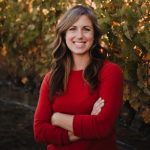
Jordan Bentley “grew-up” in real estate assisting her mother, Robyn Bentley, while being raised in Saint Helena.
Jordan earned a BA in creative writing from Colorado College and kept going east to Boston where she earned an MFA in photography from the Massachusetts College of Art and Design. After teaching at her alma mater and Tufts University, she decided it was time to return to her roots in Napa Valley.
Jordan has been working with Wine Country Consultants for over ten years and is proud to be part of her family business. Through Robyn’s mentorship and invaluable hands-on experience, Jordan has organically fused her previous talents with real estate to offer clients a unique skill set. Her creative eye and dedication to detail along with her in-depth knowledge and local perspective of Napa Valley allows Jordan to assist clients successfully reach their goals.
Jordan is an avid traveler who thrives when meeting new people and immersing herself in a new culture. Some of her favorite places are Finland, where she lived for a year as a foreign exchange student, and her husband’s native South Africa.
Jordan and her husband, Frameworks owner Rob Watermeyer, have two young sons named McCary and Gray. The four of them enjoy running, biking or strolling around town and Lake Hennessey with their dog, Pan.
Jordan is not only dedicated to her clients and family but also to serving her community. Her passion for education led her to serve on the board of her sons’ pre-school, the St. Helena Cooperative Nursery School, as President and Vice President from 2016-2022. Jordan currently serves as the President of the board of Our Town St. Helena, a non-profit dedicated to preserving and creating affordable housing for all in St. Helena. Past service led Jordan to be a board member and lead chair for the youth exchange program in the Saint Helena Rotary Club from 2014-2017.
——————————————————
To listen to the EXTRA portion of this show go to RealEstateInvestingForWomenExtra.com
Learn how to create a consistent income stream by only working 5 hours a month the Blissful Investor Way.
Grab my FREE guide at http://www.BlissfulInvestor.com
Moneeka Sawyer is often described as one of the most blissful people you will ever meet. She has been investing in Real Estate for over 20 years, so has been through all the different cycles of the market. Still, she has turned $10,000 into over $5,000,000, working only 5-10 hours per MONTH with very little stress.
While building her multi-million dollar business, she has traveled to over 55 countries, dances every single day, supports causes that are important to her, and spends lots of time with her husband of over 20 years.
She is the international best-selling author of the multiple award-winning books “Choose Bliss: The Power and Practice of Joy and Contentment” and “Real Estate Investing for Women: Expert Conversations to Increase Wealth and Happiness the Blissful Way.”
Moneeka has been featured on stages including Carnegie Hall and Nasdaq, radio, podcasts such as Achieve Your Goals with Hal Elrod, and TV stations including ABC, CBS, FOX, and the CW, impacting over 150 million people.

